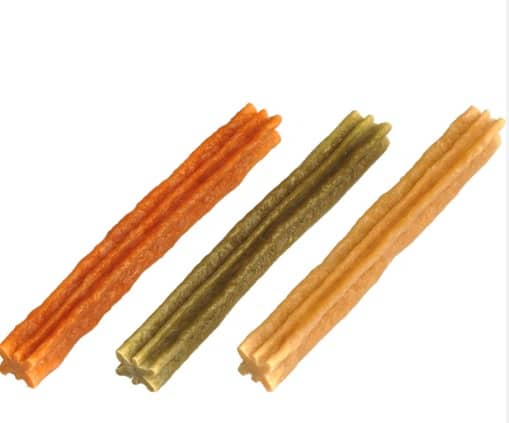According to the American Animal Hospital Association, many dogs and cats show signs of oral disease by age three. Maintaining proper dental hygiene is crucial for our canine companions, as poor oral health can lead to various health issues, including heart disease and kidney problems.
Dog dental chews have emerged as an effective way to promote good oral hygiene in dogs. These specially designed treats provide a tasty snack for our furry friends and help remove plaque and tartar buildup, freshen breath, and stimulate gums.
This article will explore the benefits of dog dental chews and how to choose the right one for your pet. We will also discuss introducing these chews into your dog’s routine and highlight other dental hygiene practices that complement their use.
By incorporating dog dental chews into your furry friend’s lifestyle, you can contribute to their overall well-being and ensure a healthier smile for years.
Key Takeaways
- Dog dental chews are effective in promoting good oral hygiene in dogs.
- Regular use of dog dental chews can prevent periodontal disease and strengthen gums.
- The size and texture of dog dental chews should be appropriate for the dog’s size and chewing habits.
- The weekly or daily toothbrush is essential for dogs’ health.
- Veterinary recommendations can help in choosing the right dog dental chews.
Benefits of Dog Dental Chews

One of the key advantages of dog dental chews is their ability to promote oral hygiene and reduce plaque buildup. These chew toy alternatives provide an effective method for maintaining a dog’s dental health.
Dog dental chews are designed to encourage chewing, which scrapes the interior of the dog’s mouth and helps remove food particles and bacteria from the teeth. Some chews contain anti-plaque compounds that help remove the plaque as well, which aids in preventing the formation of plaque and tartar, reducing the risk of periodontal disease.
Regular use of dog dental chews can also help strengthen gums and improve breath freshness by reducing odor-causing bacteria in the mouth. Additionally, these chew options can be an enjoyable activity for dogs, providing entertainment while benefiting their oral health.
Overall, incorporating dog dental chews into a pet’s routine can contribute to better oral hygiene and prevent potential dental issues.
Choosing the Right Dog Dental Chew
This discussion will focus on the factors to consider when choosing the right dog dental chew.
Size and texture are important considerations, as they should be appropriate for your dog’s size and chewing habits.
Additionally, it is crucial to look for dog dental chews that contain high-quality ingredients, such as natural enzymes or compounds that promote oral health.
Finally, seeking veterinary recommendations can provide valuable insights into the most effective dog dental chews for maintaining your pet’s dental hygiene.
Ingredients to Look For in Dog Dental Chews
The composition of dog dental chews is critical when selecting an appropriate option for promoting optimal oral health in canines. Pet owners often prefer natural alternatives and desire to provide their dogs with a wholesome and nutritious treat.
- Usually, fewer ingredients are better, but some treats have added vitamins that can expand the ingredient list, which is good.
- Opt for treats made from natural, wholesome ingredients for your dog.
- Avoid treats with added sugar or vegetable oil.
- One of the best dog treats is made from real meat and animal products.
Homemade alternatives are another option that gives pet owners better control over the ingredients used. Using simple and healthy ingredients like chicken, sweet potato, or coconut oil, homemade dog dental chews can be created that cater specifically to each dog’s individual needs and preferences.
Ultimately, selecting dog dental chews with natural options or exploring homemade alternatives ensures that dogs receive the best care for their oral health.
Potential Risks and Precautions
One must be aware of the potential risks and take necessary precautions when using dog dental chews to maintain their pet’s oral health. While dog dental chews can be beneficial in reducing tartar and plaque buildup, it is important to consider the following risks and take appropriate measures:
- Choking hazard: Some dog dental chews may pose a choking risk, especially if they are not appropriately sized or the dog bites off large chunks. Choose chews specifically designed for your dog’s size to minimize this risk.
- Digestive issues: Dogs with sensitive stomachs may experience digestive problems such as diarrhea or vomiting after consuming certain dog dental chews. It is advisable to introduce new chews gradually and observe any adverse reactions.
- Tooth fractures: Certain hard dental chews can potentially lead to tooth fractures, such as rawhide, hard plastic chews and bones, especially in dogs with weak or damaged teeth. Opt for softer options or consult with a vererinarian to determine the most suitable chew for your dog.
- Supervision: Always supervise your dog while chewing on dental treats to ensure they do not swallow large pieces or exhibit any signs of discomfort.
By being mindful of these risks and taking necessary precautions, you can safely incorporate dog dental chews into your dog’s routine for optimal oral health maintenance.
Types of Dental Chews to Avoid for Your Dog:
While numerous suitable choices are available for your furry friend, there are certain dog dental chews that everyone should avoid. Some chews can pose significant risks to your dog’s health, as reports from the veterinary oral health council noted. These chews have the potential to break teeth or cause life-threatening conditions. The most hazardous options include:
Rawhide: Although a popular choice, rawhide can be dangerous for dogs. Often excessively processed and treated with chemicals, it poses a risk of choking or intestinal blockages.
Cooked Bones: Cooked bones are extremely hazardous. They tend to splinter easily, leading to choking or internal injuries.
Sticks: Particularly those found in the yard, bars can be difficult for your dog. They are prone to splintering, breaking, and causing injuries and blockages.
Dog Toothbrushing
In addition to using dog dental chews, owners should consider incorporating other methods into their dental care routine. One such way is using a toothbrush to brush the dog’s teeth regularly. This habit can help remove plaque and prevent tartar buildup, which can lead to gum disease and tooth decay.
It is recommendable to brush dog teeth every day, but if not possible, to do it at least three times a week, check it with your vet.
Never use human toothpaste for dogs. It is toxic, as it is not designed to be swallowed. There is edible dog toothpaste for sale, and brushing their teeth with no toothbrush is possible. What makes the cleaning itself is the brushing, not the toothpaste.
Tips for Dog Toothbrushing:
- Start early: Introduce toothbrushing to your dog at a young age to familiarize them with the process. This early step helps create a positive association and makes toothbrushing easier as they age.
- Gradual introduction: Let your dog sniff and lick the toothpaste to get used to the taste and smell. Once they are comfortable, gently massage their gums with your finger or a small amount of toothpaste. Gradually introduce the toothbrush, allowing your dog to adjust to the sensation.
- Be patient and consistent: Toothbrushing may take time for your dog to accept. Be patient and reward them with praise or treats after each successful session. Consistency is key to establishing a routine and making toothbrushing a stress-free experience for your dog.
- Gentle technique: Brush your dog’s teeth with gentle, circular motions. Pay extra attention to the gum line and back molars, as these areas accumulate more plaque. Avoid applying excessive pressure, as it can cause discomfort or injury.
- Regular veterinary check-ups: Even with regular toothbrushing, it is essential to schedule regular dental check-ups with your veterinarian. They can perform professional cleanings, thoroughly examine your dog’s teeth, and address potential issues.
- Praise your dog extensively during and after toothbrushing.
What is a Dog Water Additive for Plaque?
A dog water additive for the plaque is a liquid solution specifically formulated to be added to your dog’s drinking water. It contains active ingredients that help fight plaque and tartar buildup, control bad breath, and promote oral health. The additive is diluted in the water, and as your dog drinks, the solution comes into contact with their teeth and gums, providing oral care benefits.
Most dog water additives for plaque contain ingredients that help combat bacteria and plaque formation in the mouth. These ingredients may include antimicrobial agents, enzymes, and other oral care components. The solution mixes with their saliva when added to your dog’s water. It comes into contact with the teeth and gums, inhibiting the growth of bacteria and reducing plaque accumulation.
Benefits of Dog Water Additives for Plaque:
- Plaque and tartar control: The primary benefit of using a dog water additive for plaque is its ability to help control the buildup of plaque and tartar on your dog’s teeth. Plaque is a sticky film composed of bacteria, food particles, and saliva. Over time, if not removed, plaque hardens into tartar, which can lead to dental issues. Water additives work to reduce plaque formation, minimizing the risk of dental problems.
- Freshens breath: Dog water additives often contain ingredients that target the source of bad breath, such as sulfur compounds produced by bacteria in the mouth. By reducing the number of bacteria and their byproducts, these additives can help freshen your dog’s breath.
- Convenient and easy to use: Using a water additive for the plaque is a convenient option, especially for dogs who resist toothbrushing or owners with limited time to dedicate to oral care routines. Add the recommended amount of the additive to your dog’s water dish, and they will receive oral care benefits as they drink.
Important Considerations:
- Please consult your veterinarian: Before introducing any new oral care product, including a water additive, it is important to consult your veterinarian, your dog might not need it, or it can backfire. They can assess your dog’s oral health needs, recommend suitable products, and guide usage and dosage.
- Choose a reputable brand: With the increasing popularity of dog water additives, it is crucial to choose a reputable brand that uses safe and effective ingredients. Look for products that have been specifically formulated for dogs and have undergone testing for safety and efficacy.
- Regular dental check-ups: While water additives can be a helpful addition to your dog’s oral care routine, they should not replace traditional veterinary dental check-ups. Professional dental cleanings by a veterinarian are necessary to remove existing tartar and plaque and address any underlying dental issues.
- Monitor your dog’s water consumption: Some dogs may be sensitive to the taste or smell of certain water additives. Monitor your dog’s water intake to ensure they still drink enough. If you notice any changes in their drinking behavior, consult your veterinarian.
When combined with dog dental chews, these additional practices can contribute to better overall oral health in dogs and reduce the risk of dental problems.
Homemade Dental Chews Recipes
If dog dental chews are off your budget or if you want to have more control over the ingredients of what your dog consumes, you can cook some dog dental chews for your pup! Here are some handy recipes.
Jerky, made from dried turkey, chicken, and beef, is a nutritious and natural option for homemade dog chews. To prepare, thinly slice unprocessed meat, dry it in a dehydrator or bake it in a 200-degree oven for approximately two hours. The meat slices should be cut about twice the size of the desired final chew. For a crunchier texture, dry the pieces longer, or reduce the drying time for a chewier consistency.
Sweet potato is a safe and healthy alternative to meat for dog chews. The process of making sweet potato chews is quite similar to jerky. Begin by cutting the sweet potatoes lengthwise into strips around 1/3-inch thick. Dehydrate them using a food dehydrator or bake them in an oven set at 250 degrees for about three hours. If you prefer a crunchy texture, extend the cooking time. Remember to store the sweet potato chews in the refrigerator or freezer.
Trachea is properly dehydrated; a cow’s trachea can serve as an excellent dog chew. You can obtain tracheas from various places such as butcher’s shops, meat processors, raw food co-ops, slaughterhouses, or independent grocery stores. Place the tracheas in a food dehydrator for approximately eight hours or until thoroughly dried.
Livers and Hearts, drying cattle and poultry organs, such as livers and hearts, can create chewy dog treats that are rich in protein and packed with vitamins. Slice the livers and compassion to a thickness of about one to 1/2-inch, then dry them in an oven set to 300 degrees for one hour. Adjusting the cooking time can yield a crunchier or chewier texture than other treats.
Frequently Asked Questions
Is Dental Chew Good For Dogs?
Yes. These treats can help prevent the buildup of plaque and tartar in your dog’s mouth. This buildup in the long term can cause severe illness in your dog.
Are dog dental chews as good as brushing?
No. While dog dental chews play a role in maintaining oral health, they should not replace regular brushing. Brushing is crucial for complete plaque removal and preventing serious dental issues in dogs.
How often do you give your dog dental chews?
You can give more than one dog dental chew per day. The frequency of giving then depends on individual factors such as oral health condition and budget.
Usually, there is no good reason to give your dog more than one dog dental chew per day; also, consider the number of calories in any particular treat so your dog doesn’t develop overweight.
Can dental chews help with bad breath in dogs?
Dental chews can help with bad breath in dogs. These treats promote oral hygiene by reducing plaque and tartar buildup, common causes of canine halitosis.
Do I need to give my dog dental chews?
Not necessarily; dental chews are an effective tool for a dog’s dental health, but if you brush your dog’s teeth every week or more often and your vet checks your dog at least twice per year, they won’t need them. You can also ask your veterinarian for a visit.
SEE ALSO
- Dehydrated Dog Food
- Effective Calming Treats for Dogs
- Power-Packed Victor Dog Food: Unleash Your Dog’s Potential with Victorious Nutrition!
- Acana Dog Food
Conclusion
Dog dental chews offer numerous benefits for canine oral health. By reducing plaque and tartar buildup, they can help prevent gum disease and tooth decay, which can provoke heart and kidney disease.
Choosing the right dog dental chew is important based on your dog’s size and chewing habits, and you would want to select a high-quality dog dental chew. However, it is essential to be aware of potential risks and precautions associated with dog dental chews.
In addition to using dog dental chews, implementing other dental hygiene practices, such as weekly toothbrushing, can promote optimal oral health for your beloved pet. Investigating the validity of these theories may contribute to a more comprehensive understanding of the benefits and drawbacks of dog dental chews.
Bone Voyage Dog Rescue is a non-for-profit that rescues dogs from Mexico’s streets and finds them loving homes in the USA and Canada; you can look at our lovely adoptable dogs.



